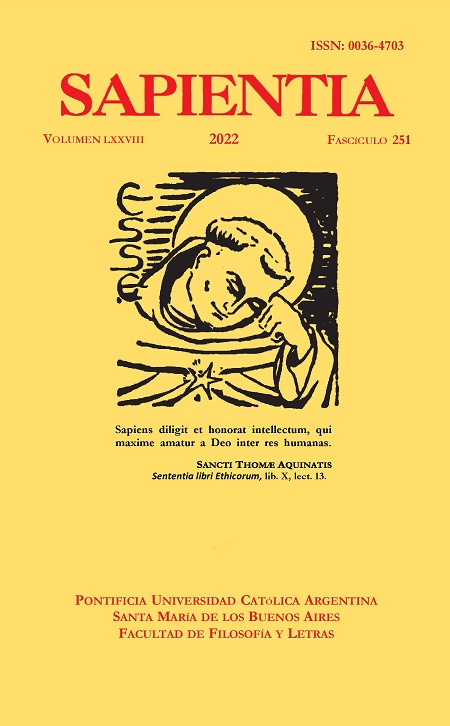The Compass and the Taste: Two Analogies for a Realistic Approach to Moral Experience
Keywords:
: ética – objetividad – subjetividad – virtud – gustoAbstract
In this paper, I propose to use two analogies in order to offer a
realistic characterization of moral experience. The analogy of the compass
allows us to delve into the relationships between the notions of teleology
(objective) and orientation (subjective), while that of taste brings to light
the undeniable role of intuition and affectivity in the dictates of moral
conscience. Finally, I will discuss my reflections with some moral theses of
Francisco Leocata.
Downloads
References
Aquinatis, Thomas. Summa Theologiae. Matriti: BAC, 1962.
Brown, Donald. «Human universals, human nature & human culture» Daedalus 133, no. 4 2004.
Chillón, José Manuel - Ángel Martínez y Luca Valera, eds., Verdad Práctica: Un concepto en expansión, Granada: Comares, 2022.
Cofnas, Nathan. «The Golden Rule: A Naturalistic Perspective», Utilitas 34, No. 3 (2022): 262-274.
Enoch, David. Taking Morality Seriously: a Defense of Robust Realism, New York: OUP, 2011.
Gill, Michael. «Moral rationalism vs. moral sentimentalism: Is morality more like math or beauty?», Philosophy Compass 2, No. 1 (2007): 16-30.
Graham, Jesse - Nosek, Brian - Haidt, Jonathan - Iyer, Ravi – Koleva, Spassena y Peter H. Ditto. «Mapping the moral domain» Journal of personality and social psychology 101, no. 2 (2011): 366-385.
Haidt Jonathan – Hersh, Matthew «Sexual morality: The cultures and emotions of conservatives and liberals» Journal of Applied Social Psychology 31, no. 1 (2001): 191-221.
Haidt, Jonathan, Silvia Helena Koller y Maria G. Dias. «Affect, culture, and morality, or is it wrong to eat your dog? » Journal of personality and social psychology 65, no. 4 (1993): 613.
Lakoff, George - Johnson, Mark. Metaphors we live by, Chicago: University of Chicago Press, 2008.
Lakoff, George - Johnson, Mark. Philosophy in the flesh: the embodied mind and its challenge to Western Thought, New York City: Basic Books, 1999.
Leocata, Francisco. Estudios sobre Fenomenología de la Praxis, 2007 55. Consultado en https://franciscoleocata.com.ar/docs/librosestudios.pdf el 3 de abril de 2023.
Macpherson, Fiona. «Taxonomising the senses» Philosophical Studies 153 (2011): 123-142.
Marcos, Alfredo. Ciencia y Acción. Una filosofía práctica de la ciencia, México DF: FCE, 2010.
McHugh, Cillian - Marek McGann, Eric Igou y Elaine Kinsella, «Reasons or Rationalisations: The Role of Principles in the Moral Dumbfounding Paradigm», Journal of Behavioral Decision Making 33 2020: 376–392.
Moore, George. Principia Ethica, Cambridge: Cambridge University Press, [1903] 1993.
Noonan, John. «The metaphors of morals», Bulletin of the American Academy of Arts and Sciences 42, No. 2 (1988): 30-42.
Richards, Robert. «Evolutionary Ethics: A Theory of Moral Realism», en The Cambridge handbook of evolutionary ethics (2017): 150.
Searle, John. «How to study consciousness scientifically», Philosophical Transactions of the Royal Society of London. Series B: Biological Sciences 353, no. 1377 (1998): 1935-1942.
Smith, Barry. «The nature of sensory experience: The case of taste and tasting», Phenomenology and Mind 4 (2013): 212-227.
Sobel, Jordan. «Kant’s compass» Erkenntnis 46 (1997): 365-392.
Westermarck, Edward. The history of human marriage, London: Macmillan, 1906.
Downloads
Published
How to Cite
Issue
Section
License
Copyright (c) 2023 Mariano Asla

This work is licensed under a Creative Commons Attribution-NonCommercial-ShareAlike 4.0 International License.





 Sapientia
Sapientia